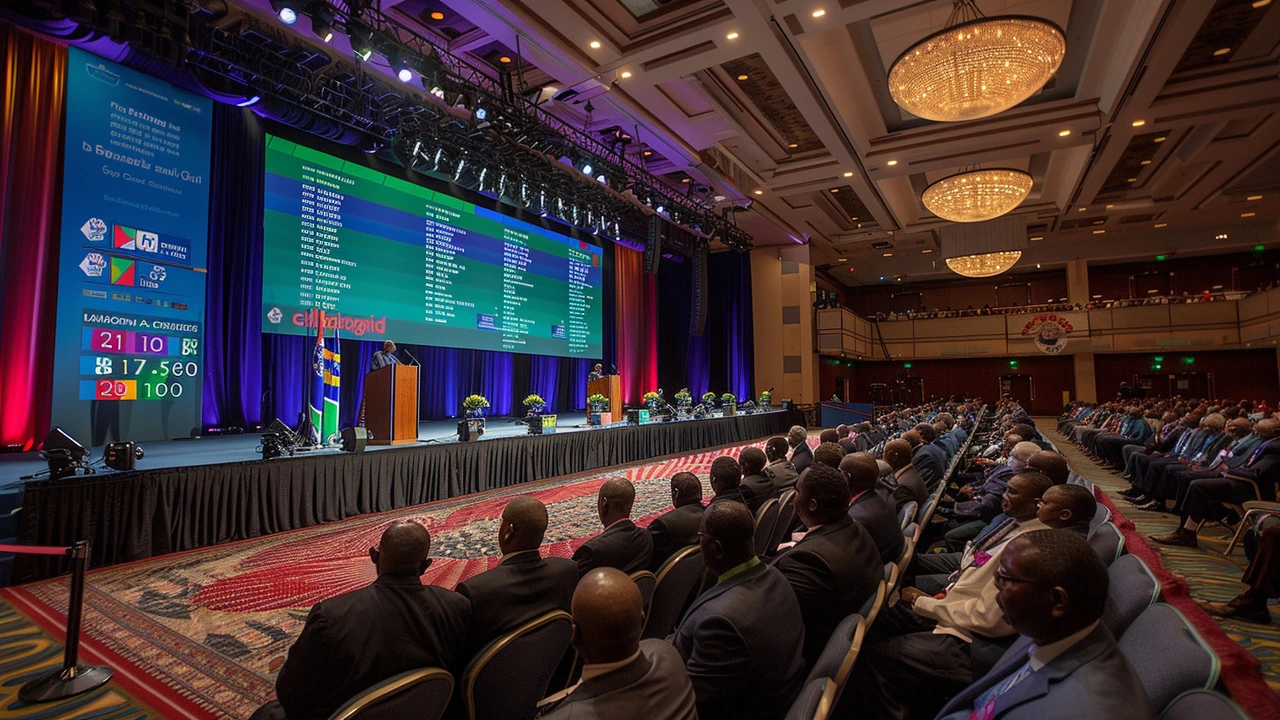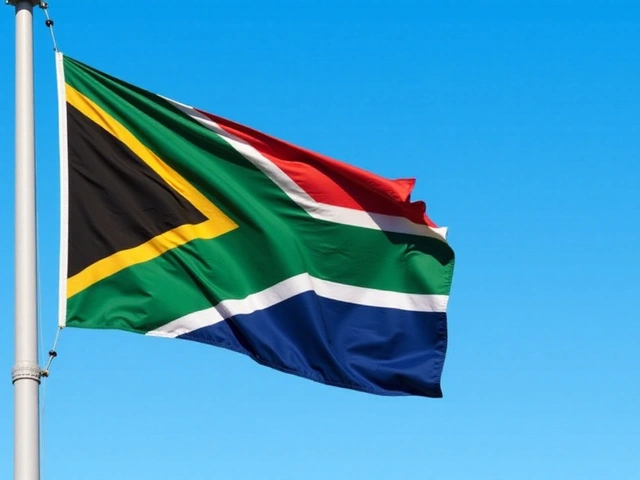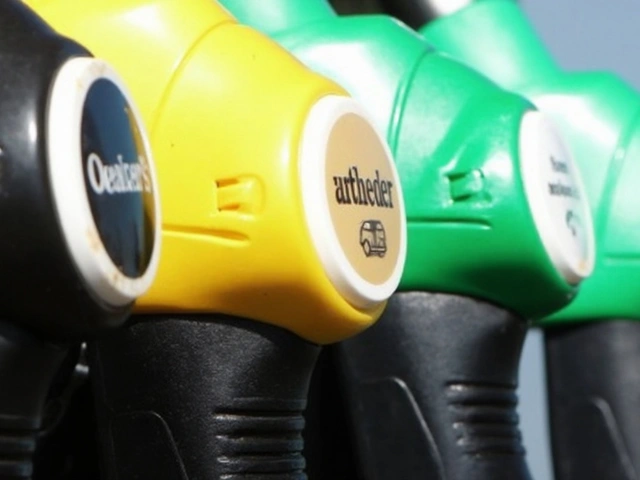South Africa's Political Landscape Transformed as ANC Loses Majority After 30 Years
For the first time in three decades, South Africa is witnessing a significant political shake-up as the African National Congress (ANC) lost its parliamentary majority. Garnering just 40.2 percent of the votes, the ANC's fall from grace reflects a growing public disillusionment with the party that has steered the nation since Nelson Mandela's historic victory in 1994.
The Democratic Alliance (DA) emerged as the principal opposition, securing 21.8 percent of the votes, while the MK party, led by former President Jacob Zuma, claimed 14.6 percent. The Economic Freedom Fighters (EFF) followed with 9.5 percent. This diverse set of electoral outcomes is reshaping the political terrain, necessitating new coalitions and alliances, and potentially fostering a more pluralistic governance structure.
President Ramaphosa's Call for National Unity
In response to these unprecedented results, President Cyril Ramaphosa has called for a government of national unity. This initiative, while noble and necessary, presents a complex challenge. Establishing such a coalition would require a delicate balance of compromises and confidence-building measures among the various political entities. The ANC, DA, MK party, and EFF will need to find common ground to govern effectively, putting the nation's needs above partisan interests.
The election process itself was praised for its transparency and evenhandedness. All political parties were able to campaign freely and access the resources of the Independent Electoral Commission (IEC). Despite some technical glitches, the IEC's commitment to providing live updates and online platforms ensured that the process maintained its integrity. Public vigilance and engagement played pivotal roles in this democratic exercise, which has been a hallmark of South Africa's electoral tradition.
Youth Engagement and New Registrations
Youth engagement was particularly noteworthy in this election cycle. An impressive 77 percent of new registrations came from voters aged 20 to 29, indicating a burgeoning political awareness among the younger generation. This demographic's active participation highlights a shift in the political consciousness of South Africa and underscores the importance of addressing their concerns in future policymaking.
The ANC's diminished performance can be traced back to growing perceptions of endemic corruption, patronage, and anti-democratic tendencies. Internal splits within the party, most notably the formation of the EFF and the MK party, have further weakened its position. The MK party, birthed from factional disputes between Zuma and Ramaphosa supporters, has posed significant challenges to state institutions and democratic principles. Controversially, the MK party has rejected the electoral results and invoked militaristic rhetoric and violence, complicating the political aftermath.
Path Forward: Coalitions and National Dialogue
The ANC has expressed a willingness to engage in discussions to form a coalition government. However, the complexity of such a coalition is magnified by the differing ideologies and priorities of the involved parties. The DA has voiced concerns over potential alliances between the ANC, EFF, and MK, fearing that such coalitions might undermine democratic norms. The EFF, on the other hand, has shown openness to collaborating with the ANC, signifying potential shifts in political alliances.
Civil society and civic groups are advocating for a National Dialogue to accompany this transitional phase. These entities believe that inclusive dialogues will help build popular ownership of the process and secure public buy-in, which is crucial for a stable transition. This approach underscores the strength of South Africa's civil society and its integral role in shaping the nation's future.
In this historic moment, South Africa stands at a crossroads. The recent elections have not only demonstrated the robustness of the country's democratic institutions but also highlighted the public's desire for change. As political leaders navigate this new terrain, their ability to prioritize national interests and foster inclusive governance will be pivotal in shaping South Africa's future. The path forward is fraught with challenges, but it also presents an opportunity for renewal and reinvigorated democratic practices.

The Integrity of South Africa's Democratic Institutions
One of the most reassuring outcomes of this election cycle is the reaffirmation of the integrity of South Africa's democratic institutions. The Independent Electoral Commission (IEC) was able to conduct the electoral process with transparency and impartiality, even amidst various logistical and technical challenges. Their efforts have been recognized both domestically and internationally, boosting confidence in the electoral system.
Despite the political turbulence, the strength of South Africa's democratic fabric lies in the active engagement and vigilance of its citizens. The robust participation witnessed in this election, especially among the youth, signals a vibrant democracy that is alive and responsive. It is this engagement that will be crucial in navigating the uncertain waters of coalition politics and in ensuring that the nation's leaders remain accountable to the people.
A Critical Juncture and the Road Ahead
As South Africa navigates this critical juncture, the responsibility lies heavily on the shoulders of its political leaders. The formation of a stable coalition government will require genuine dialogue and the setting aside of personal and partisan differences. The nation's leaders must demonstrate a commitment to democratic norms and institutions, ensuring that the interests of the people are placed above all else.
The political landscape in South Africa is more fragmented than ever before, and this fragmentation poses both risks and opportunities. While the formation of a coalition government is fraught with challenges, it also presents an opportunity for more inclusive and representative governance. By bringing together diverse political voices, a coalition government could potentially address a wider array of public concerns and foster greater political stability.
In conclusion, South Africa's recent elections mark a turning point in the nation's political history. The ANC's loss of majority reflects a growing call for change and accountability. As the country moves forward, the focus will be on building a government that can navigate the complexities of coalition politics while remaining true to democratic principles. The active involvement of civil society and the engagement of the youth will be key in shaping a future that honors the legacy of South Africa's democratic journey while paving the way for a more inclusive and accountable governance structure.





Comments
South Africa's loss feels like a cautionary tale for any nation that thinks it can coast on past glories. The ANC's complacency mirrors the decay that would fester in any country that stops listening to its people. If you look at India, we constantly reinvent our coalition tactics to keep the ship steady. The same vigor is missing in Johannesburg, and that makes me wonder how long the new parties can actually hold power. In short, change is inevitable, but only the ruthless survive.
Hold up!!! The whole narrative about "youth engagement" is being blown out of proportion, isn't it??? I mean, sure 77% sounds impressive, but are those numbers really reflective of informed voting, or just a wave of momentary hype??? Anyway, let's not forget that coalition politics is a messy business, and South Africa's new reality will test every party's patience!!!
The tides of history are rarely gentle; they crash, retreat, and reshape the very shores they touch. In South Africa, the ANC’s fall is more than a statistic-it is a mirror held up to a nation’s soul. One could argue that the cries of the young voters echo the ancient lament of societies that neglect their future for short‑term gain. When the people rise, even the mightiest walls crumble, revealing the fragile foundations underneath. This election is a reminder that power is a lease, not a birthright, and every lease can be terminated.
Interesting shift. The data shows real fatigue with the status quo, and the younger voters seem ready to push for tangible change.
New faces on the ballot mean fresh ideas 😃 the youth vote is finally being heard 👏🏽
One must ask: what is the true cost of a fragmented parliament? If the parties cannot find common language, the nation bears the silence.
The ANC’s loss of majority is a watershed moment that cannot be dismissed as a mere electoral hiccup. Historically, dominant parties that cling to power without genuine renewal tend to fragment under internal pressures. The emergence of the MK party and the EFF illustrates how ideological fissures were already widening beneath the surface. Voter fatigue is not simply a reaction to corruption allegations; it is also a symptom of a stagnant policy agenda that failed to address structural inequalities. Youth turnout at 77% demonstrates a demographic that refuses to accept the status quo. This demographic demand for accountability forces parties to confront their own shortcomings. Moreover, the DA’s rise, while modest, signals a desire for an alternative that balances market-oriented policies with social responsibility. The coalition talk, however, is fraught with complexity. Each party brings distinct priorities: the DA seeks institutional reforms, the EFF pushes for radical economic redistribution, and the MK party emphasizes nationalistic rhetoric. Aligning these divergent agendas will require unprecedented compromise. The President’s call for national unity is commendable, but it risks diluting policy specificity if parties settle for vague consensus. International observers have praised the election’s procedural integrity, yet the post‑election landscape will test the robustness of those institutions. Civil society’s role becomes crucial in mediating dialogue and ensuring transparency in coalition negotiations. If handled poorly, the political fragmentation could erode public trust and incite unrest. Conversely, a well‑crafted coalition could model inclusive governance for other emerging democracies. In any case, the upcoming weeks will be decisive for South Africa’s democratic trajectory. Stakeholders must prioritize long‑term stability over short‑term partisan victories.
Great analysis! It’s vital for newcomers to remember that constructive dialogue can bridge ideological gaps, and the nation benefits when parties focus on common goals.
South Africa must stay united.
It is commendable how peacefully the elections were conducted; the process sets a positive example for the region.
Indeed, the Independent Electoral Commission did a stellar job, ensuring transparency, fairness, and accessibility, which are pillars of any thriving democracy!!!
Look at the stark contrast between the old guard and the new voices-this could be the drama that reshapes the entire political theater!
From a structural perspective, coalition formation in a multiparty system necessitates a meticulous balancing act. Each party must assess both its policy priorities and its strategic leverage within the parliamentary arithmetic. The ANC, despite its diminished share, still holds a pivotal bargaining position, particularly in negotiating ministerial portfolios. The DA can leverage its reformist agenda to push for institutional safeguards, while the EFF’s agenda may demand socioeconomic concessions that could be contentious for market‑oriented partners. The MK faction, with its nationalist undertones, may wield influence over security and foreign policy discussions. Successful coalition governance will thus hinge upon transparent negotiations, mutual concessions, and a shared commitment to upholding democratic norms. It is essential that civil society continues its vigilant oversight to ensure these negotiations remain accountable to the electorate.
Let us approach this new chapter with optimism and a firm resolve to build a more inclusive South Africa for all citizens.
Optimism is key, but it must be paired with realistic expectations and active citizen participation.
Wow what a change!!! South Africa looks like its gonna be new again, hope it turns out gud, we all watch n wait 😅